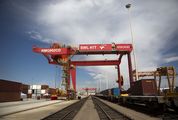TIME is of the essence for the Passenger Rail Agency of SA (Prasa), which is racing to meet infrastructure deadlines for the rollout of the first phase of its R172bn modernisation programme.
It is also looking to build a R1.4bn market precinct in the Park Station area, comprising accommodation, office buildings, retail and entertainment.
The upgrades have raised questions about how Prasa will effect the changes without interrupting a service that transports 2.2-million people daily.
However, the agency will use a "phased approach" that will allow for operations to continue with little disturbance, says the head of Prasa’s modernisation programme, Piet Sebola.
The programme hinges on two pillars: the procurement of 600 trains for its Metrorail service; and spending billions of rand on getting infrastructure ready for the new rolling stock.
The trains have been bought in a R51bn deal with Gibela Rail Transport Consortium, which is 61%-owned by French power and transport multinational Alstom.
Prasa also has a separate R5bn contract for 70 locomotives it will procure from Swifambo Rail Leasing, which is buying the stock from Vossloh España.
The locomotives are intended for the long-distance Shosholoza Meyl service, but the arrival of 13 of the stock last year triggered a public relations nightmare for the rail agency, which saw it losing head engineer Daniel Mtimkulu.
Prasa approached the High Court in Johannesburg to set aside the R5bn contract after Public Protector Thuli Madonsela recommended that the rail agency review contracts of more than R10m. Swifambo has until Thursday to file responding papers.
Metrorail, Prasa’s urban daily service, has a 2,000km rail network and an existing fleet that is between 40 and 50 years old.
The first of the Gibela trains, of 20 made at Alstom’s Brazilian facility with 20% South African content, was tested on Prasa’s new track at Wolmerton depot, near Pretoria, last week. Ten of the trains have already been manufactured, five of which are in the handover phase.
By year end all 20 will be in Prasa’s possession, placing pressure on the rail agency to get its rail infrastructure ready.
A total 580 of the trains will be manufactured at a R1bn factory, which is under construction at Dunnotar near Nigel, and is expected to be completed in June. Once built, the factory is expected to be one of the largest and most productive in the world.
The two trains in Prasa’s possession are undergoing the first round of testing at Wolmerton to see if they can reach 120km/h, says Mr Sebola.
Once that is done, the trains will be tested in Pretoria to gauge if they can reach 132km/h in a process that will be overseen by the rail safety regulator.
Although Prasa had prioritised the Johannesburg-Pretoria line, one of the busiest in its network, it had to abandon a plan to construct a depot and test track in Braamfontein in favour of Wolmerton to save face.
As of July last year, Prasa was nearly a year behind rolling out its R5bn depot modernisation programme, internal documents showed. The situation was so dire that a R2.4bn tender for the Braamfontein depot, despite it needing to be ready by November last year to house the first Gibela train, had not even been issued.
Prasa was also off track with the construction and improvement of bridges, platforms and other related structures.
Mr Sebola says Prasa worked 24-hour shifts, seven days a week, with contractors Grindrod and Mota-Engil Construction SA, to get the Wolmerton depot and test track ready by last month.
In addition to this work, Prasa will fork out R1.4bn for the major market precinct in the Park Station area.
Transport economist Andrew Marsay says Prasa is well-advised in identifying Park Station as the ideal location for a precinct development because the area has an existing transport interchange. The Gautrain, Metrorail and Shosholoza Meyl services, international bus services and taxis already operate there.
However, Mr Marsay cautions that Prasa first has to test market value by getting buy-in from leading players in property development, because this is not the rail agency’s traditional domain.
"Prasa should not do it unless it can get the private sector to equal or double its investment," Mr Marsay says. "Even if Prasa becomes a minority partner in the development, it is better to get a small share of a successful business than a big share of losses."
Mr Sebola says Gauteng should be seen as a single city comprising three major metros — Tshwane, Johannesburg and Ekurhuleni — connected by rail.
Transport analyst Paul Browning says the idea of Gauteng being a "city-region" is "beyond challenge". However, rail requires "intensive capital investment".
Closer attention should be paid to bringing "greater order" to the minibus taxi system, which transports nearly 70% of commuters, using public transport.
"Let’s think about the taxis and then let’s think about an integrated quality standard of bus network that is not based on the bus rapid transit system," Mr Browning says.
ON TRACK: Park Station in Johannesburg is set to be transformed into a market precinct in a R1.4bn upgrade that will incorporate accommodation, office buildings, retail and entertainment. Picture: SOWETAN
TIME is of the essence for the Passenger Rail Agency of SA (Prasa), which is racing to meet infrastructure deadlines for the rollout of the first phase of its R172bn modernisation programme.
It is also looking to build a R1.4bn market precinct in the Park Station area, comprising accommodation, office buildings, retail and entertainment.
The upgrades have raised questions about how Prasa will effect the changes without interrupting a service that transports 2.2-million people daily.
However, the agency will use a "phased approach" that will allow for operations to continue with little disturbance, says the head of Prasa’s modernisation programme, Piet Sebola.
The programme hinges on two pillars: the procurement of 600 trains for its Metrorail service; and spending billions of rand on getting infrastructure ready for the new rolling stock.
The trains have been bought in a R51bn deal with Gibela Rail Transport Consortium, which is 61%-owned by French power and transport multinational Alstom.
Prasa also has a separate R5bn contract for 70 locomotives it will procure from Swifambo Rail Leasing, which is buying the stock from Vossloh España.
The locomotives are intended for the long-distance Shosholoza Meyl service, but the arrival of 13 of the stock last year triggered a public relations nightmare for the rail agency, which saw it losing head engineer Daniel Mtimkulu.
Prasa approached the High Court in Johannesburg to set aside the R5bn contract after Public Protector Thuli Madonsela recommended that the rail agency review contracts of more than R10m. Swifambo has until Thursday to file responding papers.
Metrorail, Prasa’s urban daily service, has a 2,000km rail network and an existing fleet that is between 40 and 50 years old.
The first of the Gibela trains, of 20 made at Alstom’s Brazilian facility with 20% South African content, was tested on Prasa’s new track at Wolmerton depot, near Pretoria, last week. Ten of the trains have already been manufactured, five of which are in the handover phase.
By year end all 20 will be in Prasa’s possession, placing pressure on the rail agency to get its rail infrastructure ready.
A total 580 of the trains will be manufactured at a R1bn factory, which is under construction at Dunnotar near Nigel, and is expected to be completed in June. Once built, the factory is expected to be one of the largest and most productive in the world.
The two trains in Prasa’s possession are undergoing the first round of testing at Wolmerton to see if they can reach 120km/h, says Mr Sebola.
Once that is done, the trains will be tested in Pretoria to gauge if they can reach 132km/h in a process that will be overseen by the rail safety regulator.
Although Prasa had prioritised the Johannesburg-Pretoria line, one of the busiest in its network, it had to abandon a plan to construct a depot and test track in Braamfontein in favour of Wolmerton to save face.
As of July last year, Prasa was nearly a year behind rolling out its R5bn depot modernisation programme, internal documents showed. The situation was so dire that a R2.4bn tender for the Braamfontein depot, despite it needing to be ready by November last year to house the first Gibela train, had not even been issued.
Prasa was also off track with the construction and improvement of bridges, platforms and other related structures.
Mr Sebola says Prasa worked 24-hour shifts, seven days a week, with contractors Grindrod and Mota-Engil Construction SA, to get the Wolmerton depot and test track ready by last month.
In addition to this work, Prasa will fork out R1.4bn for the major market precinct in the Park Station area.
Transport economist Andrew Marsay says Prasa is well-advised in identifying Park Station as the ideal location for a precinct development because the area has an existing transport interchange. The Gautrain, Metrorail and Shosholoza Meyl services, international bus services and taxis already operate there.
However, Mr Marsay cautions that Prasa first has to test market value by getting buy-in from leading players in property development, because this is not the rail agency’s traditional domain.
"Prasa should not do it unless it can get the private sector to equal or double its investment," Mr Marsay says. "Even if Prasa becomes a minority partner in the development, it is better to get a small share of a successful business than a big share of losses."
Mr Sebola says Gauteng should be seen as a single city comprising three major metros — Tshwane, Johannesburg and Ekurhuleni — connected by rail.
Transport analyst Paul Browning says the idea of Gauteng being a "city-region" is "beyond challenge". However, rail requires "intensive capital investment".
Closer attention should be paid to bringing "greater order" to the minibus taxi system, which transports nearly 70% of commuters, using public transport.
"Let’s think about the taxis and then let’s think about an integrated quality standard of bus network that is not based on the bus rapid transit system," Mr Browning says.




















